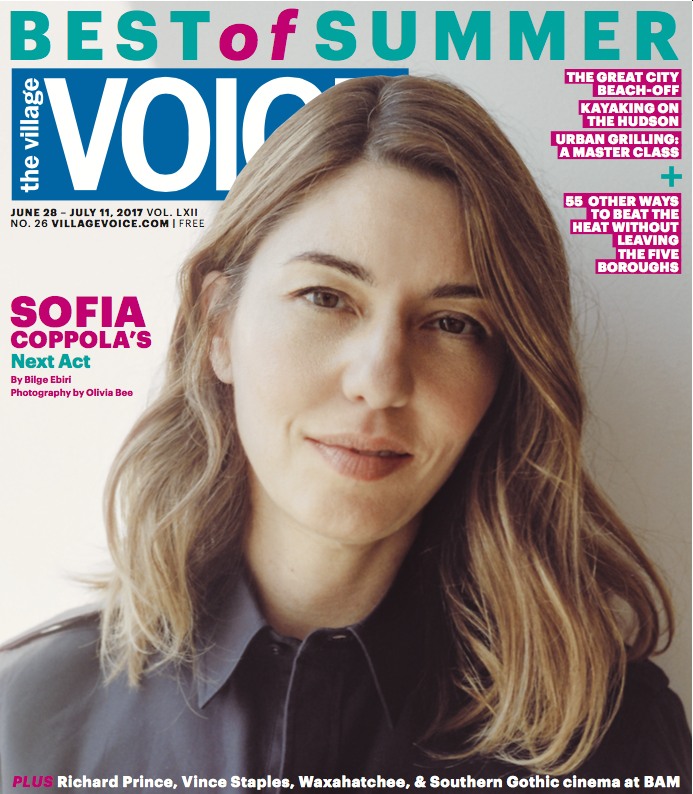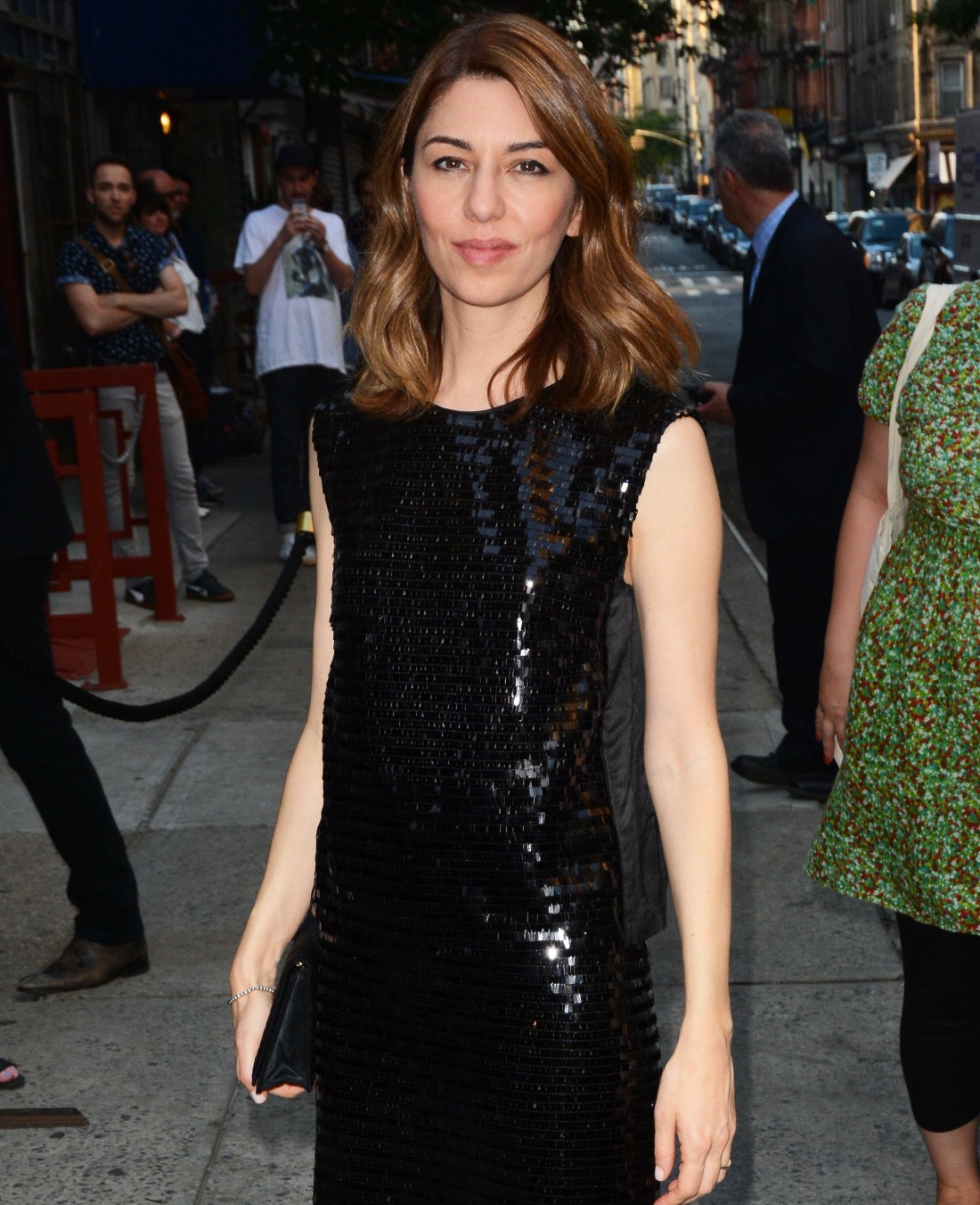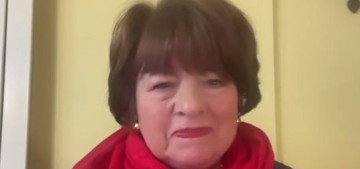Personally, I don’t think Sofia Coppola’s promotional tour for The Beguiled has gone well at all. She comes across as out-of-touch pretty consistently in every interview, whether she’s shrugging off questions about the Bechdel Test, or trying to explain why she edited out the one African-American character in The Beguiled. To recap, the original book has a former-slave character named Hallie. Hallie is “left behind” in the midst of war, just like the white Southern belles on this plantation. Hallie is tasked with caring for the wounded Union soldier, and Hattie is part of the sexual and political dynamics within the story.
Sofia completely cut Hallie out, explaining to Buzzfeed that she did so because she didn’t want to “brush over” the topic of slavery, and “Young girls watch my films and this was not the depiction of an African-American character I would want to show them” (so she prefers to show those little girls whitewashed films?) and the story she wanted to tell was about “the power dynamics between men and women that are universal.” Meaning, only stories about white men and white women get to be universal. Well, the topic came up again during Sofia’s Village Voice interview. Here’s the relevant part:
The Village Voice: You’ve been criticized for cutting out the slave character.
Coppola: The slave character was written in a really stereotypical way, and I didn’t want to make a movie about racial politics in the Civil War. So I decided just to focus on the women. When I went through the book I focused on the characters and sections I wanted to know more about and that I connected to. I left out the incest story, for example. I was very thoughtful about what I was going to include and not include. The process of adapting a book requires a lot of focus and thought on what you feel is at the core of the story you want to tell.The Village Voice: Some might say that by avoiding the character entirely, you’re helping to erase that aspect of history.
Coppola: I thought it would be worse to make the stereotypical character and then not treat that story with respect, to just brush over it lightly. It’s too important. It’s another movie. I’m also trying to focus on the story about this group of women and this man. So to have a little side character I think would be disrespectful to that story….I thought a lot about it. It wasn’t like, “Oh, I’ll just snip that part out.” I just thought to do it in a light way without giving it respect would not be the right thing to do.
The same arguments as before, only somehow worse. “So I decided just to focus on the women.” Hallie IS one of the women in the source material. Hallie is just as much a part of sexual dynamics and interplay as the white characters. Sofia couldn’t see past a character’s race to even acknowledge that Hallie IS A WOMAN TOO. “I thought it would be worse to make the stereotypical character and then not treat that story with respect, to just brush over it lightly.” I don’t get how those were seriously her only options? Include Hallie and make her a stereotype versus erase her from the story. It feels like there’s a hidden option C.
Incidentally, I would recommend that everyone read Ira Madison’s hilariously shady piece on Coppola’s whitewashed movie – go here for the piece at the Daily Beast. Some of my favorite quotes: “But there’s also a lot to be said about a white woman who stays in her lane” and “Coppola has been our foremost raconteuse of Caucasian stories.” It’s a great piece and it reads as both a defense of Coppola and an excellent takedown.
Photos courtesy of WENN, cover courtesy of The Village Voice.















Coppola is third wave uninclusive feminism personified.
It’s beyond ridiculous. Doesn’t she hear herself speak these words?
‘The slave character’, ‘just focus on the women’, ‘I focused on the characters and sections I wanted to know more about and that I connected to.’
Just. Don’t.
Kind of stunning that she can’t hear herself.
I think more disturbing is how she won at Cannes.
I understand that people of ethnicity are not men or women they are just blacks, asians, latinos, or native americans. Thank you Sofia Coppola for explaining white privilege in America.
I honestly wish her career to fail.
What ethnicity? Did you forget Europeans have different ethnicities(Balkan, Slavic, Germanic etc).
This isn’t what third wave feminism is, like at all.
Girl have a SEAT. You can’t talk about “the women” without acknowledging the slave women at the time. You know the ones also oppressed by white women.
Spot on !
I was going to watch the movie before this story came out but now I decided not to.
If she rewrote the story to remove the incest couldn’t she rewrite Halle to not be stereotypical? Or is she just admitting she cannot write for characters she doesn’t “connect” with: no one other than strait white women who are isolated?
I wrote that below without reading your comment. What it boils down to is that she didn’t see the importance of telling a black woman’s story.
If she can’t tell this story with Hallie then maybe this isn’t her story to tell. I guess that thought never crossed her mind.
White feminism is so violent and exhausting. Erasing Black women is all in a day’s work.
*Brings out popcorn for the “I understand where Coppola is coming from /I don’t get the big deal” comments*
Already here….
white woman here, came to put my support behind everybody calling out this ignorant woman. It’s about time. She has been lauded for way too long and nobody talking about this. I always wondered why she didnt ever include PoC in her films (its so blatant, its like no one besides white people exist tbh). Matter of fact…I can only think of one, and she was the unlikable villain – a biracial asian character in that bling ring movie.
white feminism is Not feminism and we should drag anybody who is under the impression.
What is so difficult to you Sofia?! Black women are women too.
Oh please! Black women are never included in the conversation concerning anything, from feminism to equality to fair pay.
It’s a sad narrative that just doesn’t exist and doesn’t seem to matter. It only becomes a topic of conversation when something like this happens.
She claims to have decided to focus on aspects of the book that she connected to.
Okay so men directors shouldn’t be involved in films that include women because how could a man connect with n understand the mind of a woman? How was sophia able to connect with the man in the book n tell his story?
She sounds like an idiot. Thanks but I’m taking a pass on Sophia Coppola n her movies.
“So I decided just to focus on the women.” Wow–talk about a clueless statement! I can’t imagine why she didn’t write a non-stereotypical version of the character into the script (option C), and I don’t understand why she would not be intrigued by the chance to look at both racial and sexual/gender politics.
Lost opportunity, because she is, visually, a good filmmaker.
I haven’t seen the film, nor read the book—- but I have to think that she could have Haillie in and changed up her role is some much more interesting way.
Also, the “little girls see my movies” excuse is ridiculous. This does not seem to be a movie for little girls. And little girls know there are slaves. My kid was learning a bit about slavery at 5 in kindergarten.
I actually wanted to see this. I loved Marie Antoinette. But she is sounding worse and worse the more she speaks.
I actually do think it’s fine that she is “staying in her lane” — the furor over this is frankly ridiculous. Who honestly wants Sofia Coppola to tell a black woman’s story?!
It would be like removing hermione from harry potter because the director wouldn’t do a good job portraying females. If she can’t tell the story from a perspective other than her own,shes both a shitty director and one that shouldn’t be telling that overall story at all.
And, you could always hire a consultant. There’s tons out there.
If a situation is too complicated for you, and the audience to large, hire someone who is an expert. Movies have this done all the time, for how policing works, for how lawyering works, for all that.
I guess Steven Spielberg should have stayed in his lane and not directed The Color Purple. Because that was a white man telling the story of Black people.
Sofia just didn’t want a Black woman in her movie. She and anyone else who thinks like her can kick rocks with no shoes on.
I tend to agree. She had a very specific vision for the film, as she does with all her work. With that in mind she didn’t have a lot of options. Making the slavery storyline a minor (and fairly offensive if at all true to the book) plot point like it is in the book wouldn’t fly well, which it definitely shouldn’t, nor would it fit into her interpretation of the book. If she made it a focus then she’d be making a very different film than the one she wanted to make. And there was no way to keep the character but drop the slavery angle given the time period.
I’ve seen the film. She cut out a lot of the book and changed quite a lot too. It’s not like she stayed faithful to the book bar Hattie, she mostly just used it as her foundation.
It would have been, and still would be cool if a different filmmaker did the same thing of using the book as inspiration, but used Hattie as their entry into the story. That could be a great film. But it wasn’t the story Coppola saw. And tbh, is it really a story we want HER making? She told the story she’s equipped to tell.
Jessie, you always have good comments on film. What did you think of the film itself?
Oh please, stop making excuses for this woman. She even referred to Hallie as a slave character, not a woman like she did with the rest of the women. Hallie was a very big part of the book. So what she changed other things that were in the book. To take out a major character the way she did is very telling. Sometimes you have to call a spade a spade. Of course it wasn’t the story she saw in her White blonde mind.
@Jeesie what I don’t understand is why people are acting like “the slavery storyline” is a completely separate story. Now I admit I haven’t seen Sofia’s film, nor have I read the book. However, my understanding is that the film is about a group of women exploring their sexuality and the power dynamics between men and women. Hattie is a woman too, who presumably has sexual desires. Wouldn’t it be fascinating to see her explore her femininity while dealing with the power dynamics of being a slave during the Civil War. It doesn’t have to be a completely different story.
@jesse
Well all that you written may be so but, Coppola is doing a very poor job at outlining this ” vision”
For one she repeatedly states that she wanted the film to focus on the ” women ” as if black women aren’t women too
Then she admits to changing the story and making it her own but use the excuse the original black female character was written as a stero type But if you changed the story to make it your own why couldn’t you change that ?
FInally she insist that the only two options are to write a black stereotype or not all, really those are her choices?
She can write and direct whatever she wants but her comments about it actually bug me more than the exclusion of the character
I’m sorry but she just confessed that she doesn’t see WOC as being WOMEN. She took a female character’s gender identity away from her and only sees her as an object, a slave. These were human beings who were enslaved. Women who were enslaved.Men who were enslaved. Children who were enslaved. This is the most blatant racist remark I have read since Tom Sawyer. WOW!
@ Jessie exactly. She had no choice. I mean black women are not women and if you can’t present a black person as a stereotype, you mind as well not present them at all. Am I right? :/end sarcasm
Telling a story set in New Orleans during the Civil War and omitting slaves is like telling a story about a couple in Bethlehem and omitting Jesus. A critical element of the plot line can’t just be axed.
Thank you!!
I think the story (at least the book version) takes place in Virginia but was filmed in New Orleans. Same point though.
It’s kind of like making a movie about Marie Antoinette without mentioning the French Revolution….oh wait.
I think a pattern is emerging. It’s intellectual laziness on her part and her unwillingness to get into the politics smacks of a very privileged existence. “Politics” wouldn’t touch her as a wealthy American woman so her own experience tells her it isn’t important.
It’s a shame because she is talented but not going the extra mile and broadening her perspective is limiting her as a director. If she never challenges herself, she’ll always be a good but not great director.
@detrius was going to comment similarly. If Sofia can’t handle writing and i don’t think she can do deep writing with social issues, hire an awesome co-writer—there are SO many talented WOC writers who would lend their brilliance to a project, get co-writing credit and truly do an intersectional feminist movie—move from mediocre consumer piece endorsed by Vanity Fair to real art, complex and violence and truly WOMEN, not ante-bellum feminity nausea.
Beguiled is a story of violence and gender, but it is absolutely a story of race in America, too. why set it in the Civil War plantation south, if it is not?
@Talie I totally agree. This is being blown so far out of proportion. She did have creative control over this movie, her explanation over this was fine and in no way is it racist. People are misinterpreting her words to use them from an angle to put her down. What happened to logic? There is nothing to read between the lines about in Sofia’s response to these accusations. This whole situation is a non-issue.
If Sofia were a POC and she did the exact same thing, there would never have been a problem. Now I am sure people will say I’m wrong for saying that but it’s the truth.
@poorlittlerichgirl just because you, as an individual, don’t comprehend how erasure is racist doesn’t mean it isn’t–it just means you don’t understand (just like I don’t understand your logic question). As for your “If Sofia were a POC” conjecture: 1. The question of why you would remove a female character after repeatedly professing to being interested in telling stories about women would still come up…and that’s not even touching on why someone would want to sanitize the Civil War by ignoring slavery in general but particularly as it was present in the source material. 2. What on Earth are you talking about? POC, particularly artists, are subject to criticism based on the use and representation of race in their work, see: Ana Lily Amirpour for a very recent example. Your conjecture is odd and suggests that POC are inherently privileged to be insulated from thoughtful criticism… but I’m assuming you think that is “in no way racist”.
Or how about re-drafting the character as a PERSON? Studios do that all the time. Big Little Lies had situations added in and taken out. The daughter was made older, for instance. They had Reese’s character have an affair; that wasn’t in the book. This is just a lazy way to try to hide her own biases.
Her choice of words is very telling. She calls Hattie “the slave character” and never uses “woman”. Then she says she wanted to tell a story about “the women” confirming that Hattie is NOT a woman in her eyes.
I don’t get these film makers who are so racist they act against self interest. Having her there would have allowed her to weave a more thought provoking story. It would have more buzz and appeal to more cinema viewers. It’s absolutely bizarre.
I know! I noticed that. She’s not a woman, but a slave: “the slave character”. Unworthy to the story in Coppola’s eyes. Infuriating.
I was going to say something similar but you made the points better than I could. Guess she’s never heard of Sojourner Truth? Or understood that a person can be in different categories at the same time?
Yikes.
It just shows the lack of imagination Coppola has if she couldn’t figure out how to write Hallie in a way that challenged stereotypes.
“The slave character was written in a really stereotypical way, and I didn’t want to make a movie about racial politics in the Civil War.”
This makes no sense. She wrote the screenplay for this version. She could have included the character of Hallie (plus reintroduced the novel version of Edwina, who was white-passing mixed race in the original source material), or is she admitting to being a one-note writer on top of a one-note director? It would have been such a more textured and nuanced story if she’d thought outside her own bubble.
According to her black woman = just black, not a woman; white woman = character, the universal woman. But it’s nice of her to not have to care about racial politics , though. Good for her. /s
@SW Think of the kudos Coppola could’ve gotten in the age of #OscarsSoWhite if she had not only kept Hallie but found a light-skinned black woman to play Edwina, whose skin color was dark enough for the other women to know she wasn’t quite white. But Coppola has a history of erasing women of color and of stereotyping people of color. In the “Bling Ring,” she erased the undocumented immigrant character, and she made Japanese people out to be buffoons in “Lost in Translation.” This is old hat for Coppola. But as an Italian American, Coppola is wrong to identify with the WASPy white stars of “The Beguiled.” Italian Americans faced fierce discrimination in Louisiana, where the film was set. The largest mass US lynching history took place there, and it was Italians, not blacks, who were lynched. She’s identifying with the oppressor, and doesn’t even know it. This is why knowing one’s history is fundamental.
All of this has turned me off from seeing the movie.
Same. Before I knew about this nonsense, I was excited to see it, but now I don’t think I want to support Coppola’s whitewashed vision.
Same. I’m going to see Wonder Woman a second time instead of this.
It’s been said that she’s really only good at creating movie mood boards of white blonde women, obnoxious soundtracks, and ennui. In some cases, that style works. “Lost in Translation” is a great movie and one of my favorites. Everything else she’s done seems mostly aesthetic-driven, and I guess a black woman didn’t fit in her blonde waif aesthetic. *eye roll*
I started reading thinking “oh no not again with this” because while I agree that it’s lazy at this point not to tell a black woman’s story because it’s a whole other story I also know that Coppola’s world is very specific and closed.
However, when she says that she wanted to tell a story about “the women”, she is implying that a black character is genderless and therefore not a real multi-dimensional human.
I really hope this is a case of mis-quoting ot something because, dude, that is the most racist thing I ever read casually on a mag.
Nah, I don’t think she was misquoted. I’ve heard this sentiment – this notion that black women aren’t actual women – expressed over and over. The idea that black people and other POC aren’t quite as “human” as white people are…it’s like a central theme in the rhetoric of racism, and it’s deeply embedded in our collective conscience.
@Lobbit, RIght on. Honestly, I think I’ve experienced the worst racism in my life from white women, both in my workplace and in my personal life. White women behave as if there’s no question about it–they’re superior to me as a black woman. When I’ve challenged them in the workplace or just been my authentic self (intelligent, dressed nicely, competent worker), they didn’t like it. When I married my white husband, his mother and sister gave me the worst time of anyone. I am over thinking that white women are my sisters in solidarity. They believe they own womanhood and that women like me don’t really count. You may be a white woman, for all I know, but white women I’ve run into who actually understand intersectional feminism are rare. In fact, I don’t know if I’ve met such a woman in real life, only online.
I don’t sympathise at all, this is the second time she has removed a non white character from an existing story so she can focus on rich pretty blondes. if she was sticking to her lane she would have never considered the bling ring or this movie in the first place. villagers, grab your pitchforks!!!
We know why-she doesn’t think black women matter or are full human beings. It also makes her a weak storyteller as this character wasn’t minimal. No worries though, the industry is full of remakes and someone else with the actual skills will redo this properly one day soon. NEXT.
What do you expect from a woman who single handedly ruined the Godfather Trilogy with her total lack of even a hint of acting ability. Nice to be the daughter of Frances Ford Coppola.
oh boy, could this be her Pepsi moment?
How can you make a movie about the Civil War and NOT have some racial politics in it???
How do you say you want to make a movie about “the women”, and just omit one of them in such a gross, dismissive way?
And how can you complain about a character being a stereotype when you are the WRITER AND DIRECTOR, and in complete control of the movie?!?!
Last time I checked, during the civil war those “women” couldn’t even get dressed in the morning without the help of a slave, but she couldn’t be bothered to include the one in the book? She’s ridiculous & lazy.
Ha! Quite true.
Sofia Coppola is canceled.
Seriously, I just can’t like her anymore.
She’s always been like that; it’s just that (white) people finally realize it.
Yeah, unfortunately. I do love her aesthetic, but am seeing more and more that that’s all she has going on. She can’t tell a complex story and doesn’t seem to want to improve or develop herself, which is essential in any creative field. Whatever.
All her movies are very white washed, that is her MO. The Virgin Suicides book for example takes place in Grosse Pointe Michigan and is basically a metaphor for the white flight and decay of Detroit in the late 60s. Something she managed to erase completely and make it all about the pretty blondes.
On a more positive note, at least I have another book to add to my list. Always read the books!
@Sadie Marie. Not really, it being one of my favorite books the only thing it acknowledged was that some Christians had problems with Jews getting into the country club. It covered that Detroit decayed after they died, but then that’s not really what the book or movie was really about, was it?
@Monica without going into an essay, there is something called “metaphor” look it up.
More evidence of the bubble that Hollywood lives in. Coppola is a film scion and this is her world view of women, Americans, people… She has the privilege of a large form platform, and these were the choices she made as a director.
Get out of your hipster, pseudo progressive, privileged shell and expand your friend circle, Sofia. Racism wears a lot.of different masks.
“The slave character” Really??!! Ugh I want to rant about this but honestly she is tiring. Officially canceling her.
The fact that she’s characterizing Hatti as a “typical slave character” is exactly the reason it was so easy for her to leave her character out. She doesn’t see Hatti as worthy of any other title but slave, so why would Coppola actually put in any work to writting her as a 3-dimensional character? It’s lazy and bullsh*t, top to bottom.
She really doesn’t understand why this is an issue for ppl. And is no one else from the cast doing promotion for this movie?? Cause Sofia needs to stop talking. I really wanted to see this movie, but now every time I see her name or an article about the movie I get annoyed.
She’s the modern, female version of Woody Allen. All those films taking place in nowhere but NYC and not a POC to be seen! How do you even walk down one street in NYC and not see at least one non-white person?!
Anyway, I agree with those above who point out the egregiousness of producing a film that takes place in Civil War-era New Orleans and does not have any black people in it. I would most definitely have seen this movie if had the character of Hattie because there would be so many nuances – that are now missed – regarding the social stratification between black and white women – especially at that time – and their relationships with one another.
So count me out on this film. Such a shame, but at least I found a good book to add to my Kindle!
In the novel The Beguiled, the character being referenced is named Matlida, or Mattie. She is the house servant to the Farnsworth School, not left behind in any way. Mattie is another voice in a novel constructed of first-person points of view, showing each woman’s experience with their “guest.” Mattie is an important character in the novel because it is from her point of view that the reader experiences the group’s decision to “deal” with their guest, and the final chapter in the novel is from Mattie’s point of view.
I haven’t seen the original film version of The Beguiled, so I assume the character’s name was changed to Hallie or in some cases Hattie? Perhaps Coppola didn’t read the novel.
It was changed to Hallie in the previous movie. The Edwina passing-as-white subtext was also dropped in the previous film, I think (it’s a been a while since I’ve read the book, and longer still since I’ve seen the older movie so I may be a bit hazy). But, you’re right: Mattie was integral in the book and not a one-paragraph throwaway character.
I came to write the same thing about both Mattie and Edwina.
The more she tries to defend her decision the deeper the hole she digs for herself. She’s brushing over her excuse for writing out the character of Hattie for not wanting to brush over the character of Hattie (If that makes sense).
White women = universal. Non-white = niche. As usual we’re all expected to pander to white as accessible and relatable while non-white is pushed to the back as alien. No thanks won’t pay a penny for this.
Doubt she cares honey
If she wasn’t riding her father’s coat tails for a career she might.
Her reasons are completely baffling to me. I have no clue how someone can think those reasons are valid. What a narrow minded woman…. shame.
This site is literally called CeleBITCHY tho so…
(wrong spot)
Can she please just shut up now?
It’s her movie to direct–not yours. Think you can do better? Then make one with the character you wanted. Y’all are acting as if she murdered someone. The inclusion of this character wouldn’t have ended racism. It’s just a movie. Fiction. Priorities, people.
She has the right to direct whatever film she wants, and others have the right to criticize her choices. Nobody is acting like she murdered someone. People are just shocked by how tone-deaf and blantantly racist she comes across. She’s basically saying that she doesn’t view “the slave character” as a woman. As others have mentioned, her explanation is almost more offensive than the fact that she excluded the character.
Look, she likes telling stories about young, pretty, thin, privileged white women (even if their only privilege is being young, thin, and pretty), and dealing with a black woman’s story in that era (or any really) might at best require an unpack, at worse require her narrative faves to be the *gasp* bad guys.
I don’t see her being willing or wanting to deal with that. Or having dealt with that in any of her films. That’s why they have the focus they and subjects they do.
Can’t unpack, won’t unpack.
None of this is surprising to me I always felt this attitude was a very real subtext in her films
Perhaps next time though, she should stick to an era she can convincingly kid everyone that this isn’t an issue for her it’s just that there weren’t any WoC in that part of the world/source material/setting or time to cover them without getting off ‘the point’.